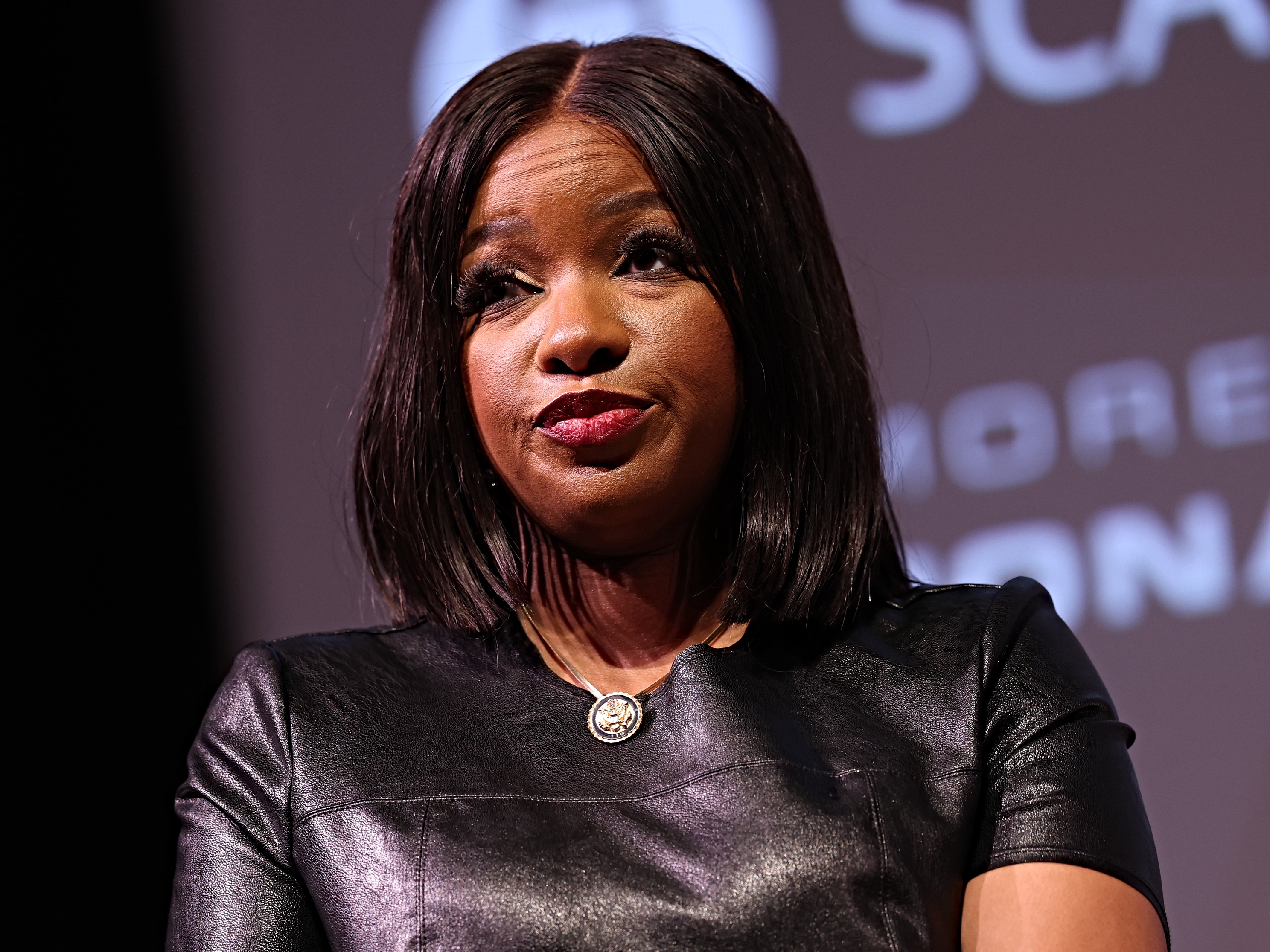The Political Standoff That Shook Thanksgiving: Charlamagne tha God Challenges Rep. Jasmine Crockett in Shutdown Showdown
In a media moment that rattled both Capitol Hill and middle America, one of the most recognizable voices in urban media made an unexpected appeal to a rising Democratic firebrand. Charlamagne tha God, co-host of the nationally syndicated radio program “The Breakfast Club,” issued a passionate call for Congresswoman Jasmine Crockett to reconsider her hardline stance during the government shutdown saga that has now stretched past the one-month mark.
With the nation feeling the real-life consequences of political gridlock—from frozen paychecks to food insecurity—Charlamagne’s message to Crockett was clear, firm, and surprisingly personal: “Throw in the towel before it’s too late.”
His remarks, broadcast to millions of listeners, carried weight far beyond the studio walls. Known for his sharp political commentary and no-nonsense critiques of both parties, Charlamagne struck a tone that blended frustration with genuine concern for everyday Americans caught in the crossfire of a shutdown that shows no sign of abating. The conversation that followed wasn’t about left versus right—it was about families versus failure.
How Did We Get Here?
The government shutdown began on October 1, 2025, after lawmakers failed to reach an agreement on a spending package. At the center of the impasse: disputes over healthcare funding, specifically proposed cuts to Medicaid and alterations to Medicare safeguards. Democrats have largely stood united in opposing reductions to these programs, arguing they are essential lifelines. Among the most vocal defenders is Representative Jasmine Crockett of Texas.
Crockett, elected in 2022, has emerged as one of the most high-profile progressive voices in Congress. A former public defender and civil rights attorney, she has taken firm stands on everything from voting rights to healthcare access. In her view, yielding on healthcare funding in this shutdown battle would mean abandoning the communities she was elected to serve.

“This isn’t some abstract budget line item,” she said during a recent press conference. “This is the difference between life and death for families in my district and across this country.”
Charlamagne’s Call for Compromise
Charlamagne tha God—whose real name is Lenard McKelvey—has long been a cultural barometer, especially for Black audiences who trust his ability to speak candidly on the nation’s most pressing issues. On air, he did not mince words. His call for Crockett to soften her position came not from a place of opposition, but urgency.
“Jasmine, we’re in the middle of a holiday season where people can’t buy groceries, can’t pay rent, can’t even afford gas to visit their families,” Charlamagne said. “You know I respect your fight, but at some point, fighting smart means knowing when to regroup.”
His remarks resonated because they echoed a growing sentiment among voters—especially those impacted by the freeze in federal services. For millions of Americans, the political debate over healthcare funding has morphed into a much more immediate crisis: how to survive when federal support has stopped.
The Real-World Impact
The effects of the shutdown have rippled through every corner of the country. Over 800,000 federal workers remain furloughed or unpaid. National parks are shuttered. Regulatory agencies have paused inspections. Veterans’ benefits, small business loans, and housing assistance programs have all experienced delays.

But perhaps the most visible and visceral consequence has been the disruption of SNAP (Supplemental Nutrition Assistance Program) benefits. In Rep. Crockett’s own district, over 200,000 residents rely on these benefits to put food on the table. Food pantries are reporting record numbers of visitors. Churches are stepping in to fill gaps they can’t possibly sustain. Grocery stores are seeing customers abandon carts when EBT cards return “insufficient funds.”
It’s this reality that fueled Charlamagne’s comments. His message was not to abandon principle, but to prioritize people. And while Crockett has not wavered in her stance, even her closest allies acknowledge the delicate balance between holding the line and holding the public’s trust.
A History of Mutual Respect
Charlamagne and Crockett are no strangers. Over the years, she’s appeared multiple times on The Breakfast Club, offering thoughtful commentary on criminal justice reform, economic equity, and the intersection of race and policy. Charlamagne has praised her in the past as “one of the few politicians who actually gets it.”
Their public rapport has always been one of mutual respect. That’s part of what made his appeal so striking: it wasn’t an attack, it was a challenge from one truth-teller to another.
“I know Jasmine’s heart,” Charlamagne said during the broadcast. “She’s for the people. But the people are in pain.”
Crockett Holds the Line

In a follow-up interview, Crockett addressed the remarks with characteristic clarity.
“I hear the frustration. I feel it, too. But compromise without accountability isn’t a solution. It’s surrender,” she said. “The shutdown hurts, but letting healthcare protections get gutted will hurt for generations.”
Behind the scenes, sources close to Crockett confirm she’s exploring potential side deals that might preserve key protections while reopening parts of the government. But any such maneuver carries risk—both political and practical.
As one Capitol Hill aide put it, “She’s walking a tightrope. Fold too soon, and she looks weak. Hold too long, and she risks alienating swing voters.”
What’s at Stake
With Thanksgiving looming, the pressure is mounting on both parties to find a resolution. Senate leaders have expressed tentative optimism, with Majority Leader John Thune noting “real progress behind closed doors.” Still, no firm deal has emerged.
The White House, meanwhile, continues to push for a clean spending bill that protects Medicaid expansions. Analysts warn that failure to pass a bill by early December could lead to permanent loss of services for some federal programs.

And voters? They’re tired. Polling shows that a majority of Americans blame both parties equally for the shutdown, but independent voters—a critical bloc heading into 2026—are particularly frustrated by what they see as unnecessary brinkmanship.
Two Titans, One Tension
At the heart of this drama are two people who care deeply—just in different ways. Charlamagne represents a cultural voice, demanding urgency and responsiveness. Crockett represents political willpower, defending policy with fire and focus.
Their disagreement isn’t about ego. It’s about how best to serve. And perhaps that’s what makes it so compelling: in a country exhausted by cynicism, two people who still believe in the power of government to do good are clashing not out of malice, but meaning.
“We can disagree,” Crockett said. “But we do it as allies who want the same thing: dignity and opportunity for our communities.”
Charlamagne, in a later segment, echoed that sentiment: “Jasmine’s not the enemy. In fact, she might be the solution. But even the strongest fighters need to know when to pivot.”
What Comes Next

As the shutdown drags on, all eyes remain on Capitol Hill—and on voices like Charlamagne’s, which increasingly shape the public mood.
For Rep. Crockett, the path forward remains steep, but not impossible. She continues to advocate fiercely for healthcare protections, even as she explores strategic ways to restore funding to the programs frozen by the shutdown.
One thing is certain: both she and Charlamagne have elevated the conversation beyond mere headlines. In doing so, they’ve reminded a weary country that democracy isn’t just about winning. It’s about showing up, speaking out, and doing the hard work of leading—even when it hurts.
And maybe, just maybe, that’s the beginning of a solution.






